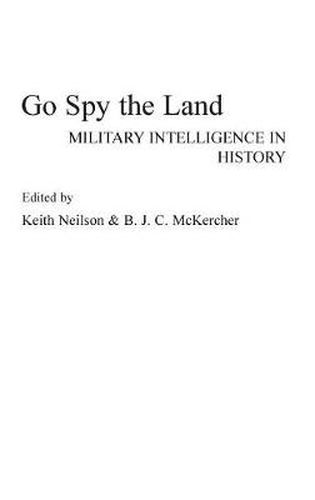Readings Newsletter
Become a Readings Member to make your shopping experience even easier.
Sign in or sign up for free!
You’re not far away from qualifying for FREE standard shipping within Australia
You’ve qualified for FREE standard shipping within Australia
The cart is loading…






For too long military history has ignored the role of intelligence. As a result, many people do not realize that intelligence has played a significant role in history. However, intelligence gathering, evaluation, and analysis has always been part of war. Lack of knowledge of how intelligence has been utilized in wars makes for an incomplete and inaccurate picture of historical events. While many are aware of such things as the Allied code-breaking efforts in World War II, few know that similar activities were undertaken as early as the beginning of recorded history. By examining a number of case studies from Roman times to the present, Go Spy the Land reveals the essential continuity in military intelligence, the fact that many of the problems involved in military intelligence have remained constant, and the nature of the problems themselves. According to the authors, military intelligence has always been an important aspect of military planning and campaigns. Furthermore, military intelligence in its essentials has not changed over time: while technology and society have affected the ways in which this essential activity has been carried out, the problems inherent in the task have remained constant. The latter conclusion is something not generally appreciated in the intelligence field, which has been dominated by historians studying the 20th century. This collection not only provides case studies, but also shows that much of what is claimed as exclusively a product of the 20th century has its roots as far back in time as the Roman Empire.
$9.00 standard shipping within Australia
FREE standard shipping within Australia for orders over $100.00
Express & International shipping calculated at checkout
For too long military history has ignored the role of intelligence. As a result, many people do not realize that intelligence has played a significant role in history. However, intelligence gathering, evaluation, and analysis has always been part of war. Lack of knowledge of how intelligence has been utilized in wars makes for an incomplete and inaccurate picture of historical events. While many are aware of such things as the Allied code-breaking efforts in World War II, few know that similar activities were undertaken as early as the beginning of recorded history. By examining a number of case studies from Roman times to the present, Go Spy the Land reveals the essential continuity in military intelligence, the fact that many of the problems involved in military intelligence have remained constant, and the nature of the problems themselves. According to the authors, military intelligence has always been an important aspect of military planning and campaigns. Furthermore, military intelligence in its essentials has not changed over time: while technology and society have affected the ways in which this essential activity has been carried out, the problems inherent in the task have remained constant. The latter conclusion is something not generally appreciated in the intelligence field, which has been dominated by historians studying the 20th century. This collection not only provides case studies, but also shows that much of what is claimed as exclusively a product of the 20th century has its roots as far back in time as the Roman Empire.